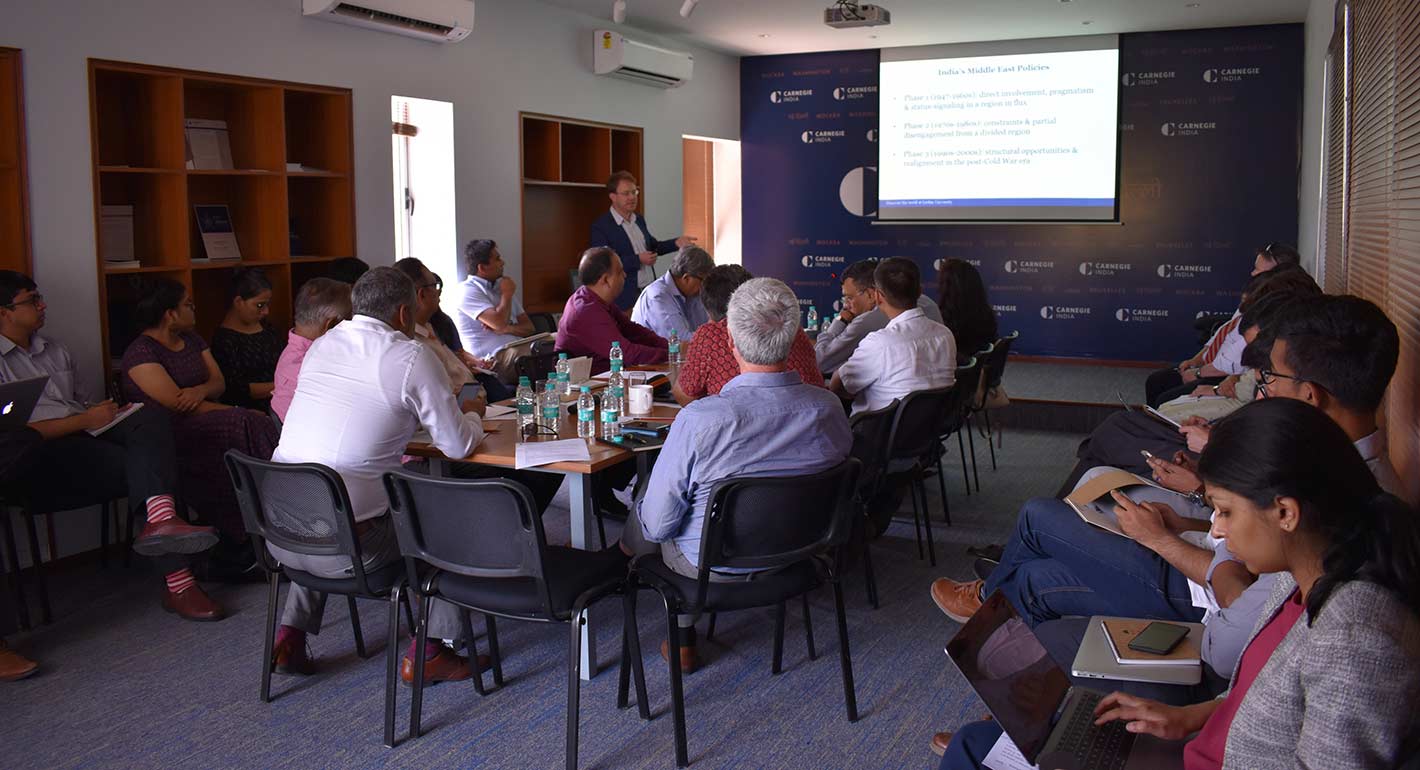Registration
Thank you!
You will receive an email confirming your registration.
Under Prime Minister Narendra Modi, India has shed its traditional defensiveness toward the Middle East and engaged with all relevant actors in the region, including members of the Gulf Cooperation Council, Israel, and Iran.
Carnegie India hosted Nicolas Blarel, assistant professor of international relations at the Institute of Political Science, University of Leiden, for a roundtable discussion to assess change and continuity in India’s Middle East policy. The discussion was moderated by Rudra Chaudhuri, director of Carnegie India.
Discussion Highlights
- Evolution of India’s Middle East Policy: Participants noted three phases in the evolution of India’s foreign policy toward the Middle East. They discussed that the first phase, from 1947 to the 1960s, coincided with the beginning of the Cold War and saw India’s direct involvement and status signaling in a region in flux. In hindsight, they noted that India overstretched itself through its involvement in all regional issues during this period. They added that by aligning with Egypt during this period, India isolated other key actors in the region, such as Saudi Arabia. They underlined that the second phase, from the 1970s to the 1980s, was marked by partial Indian disengagement as regional divisions grew. They added that the third phase, from the 1990s to the 2000s, saw greater Indian engagement with key states in the Middle East in the face of regional realignments that followed the end of the Cold War. Participants emphasized that in the current, fourth phase, India has continued its multi-engagement with all actors in the region. To illustrate this, they highlighted India's increased outreach toward the Gulf Cooperation Council, its the public acknowledgement of its ties with Israel, and Prime Minister Modi’s successive visits to the United Arab Emirates (UAE), Saudi Arabia, Iran, Qatar, and Oman.
- Key Determinants: Participants discussed the key determinants of India’s policy toward the region and agreed that it is a result of two key factors—the diverse and shifting interests toward the Middle East, and the cognitive predispositions of Indian leaders. The participants further agreed that India’s evolving interests in the region include its reliance on Middle Eastern oil and gas, remittances from its diaspora community, and a renewed focus on increasing trade and Foreign Direct Investment. Participants noted that Indian policy toward the Middle East is also dependent on structural conditions in the region, and their leaders’ perceptions of India’s interests, capacities, and role in the region.
- Modi’s “Think West” Policy: Participants agreed that India has shed its traditional defensiveness in engaging with regional players in the Middle East, and that its “Think West” policy is now largely dictated by the free market. They further noted that India’s large diaspora in the region is no longer perceived as a liability by the central government, but as an asset. The participants further explored India’s efforts in developing the Chabahar port in southeast Iran as a positive step toward furthering India’s relations with the region. Thus, the participants agreed that there have been increased public exchanges, visits, and an institutionalization of partnerships. Finally, they added that India’s domestic politics no longer constrains its engagement with states in the Middle East.
- Regional Perceptions of India: Participants also discussed how perceptions of India’s interests, capacities, and capabilities have altered globally. They stated that India has emerged as an independent entity in the region and is no longer compared to its neighbor, Pakistan, in diplomatic conversations. Participants noted that Prime Minister Modi has engaged with the region effectively, and cited the many defense agreements that the Modi government has institutionalized with various Middle Eastern nations. India is now being viewed as a crucial market for defense, particularly by Israel, they stated.
- Looking to the Future: Participants agreed that while conditions are ripe for India to build strong partnerships with various Middle Eastern nations in the long-term, some challenges remain. They discussed the difficulties in accommodating Iran with other regional actors, along with the risks that may emerge if the United States strategically disengages itself from the region. Participants suggested that India should link the Gulf to its extended neighborhood and the Indo-Pacific region. They agreed that Modi’s rationale of pursuing economic diplomacy has been successful and should be further emphasized going forward.
This event summary was prepared by Upasana Sharma, a research intern at Carnegie India.
